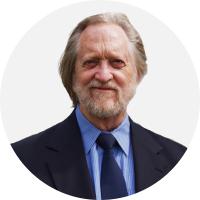The views expressed in our content reflect individual perspectives and do not represent the authoritative views of the Baha'i Faith.
I love retirement, because it brings me a little closer to death, the goal of all life.
I am happy to be retired from what they paid me as a professor, and though I miss the pay, I in no way miss grading papers. I am also eternally grateful to my grandfather who bequeathed me a bit of land, the sale of which provided me with sufficient funds to keep me, my wife, my mother-in-law, my youngest son, the dog, and the chickens in groceries. What is more, now that I have completed all the work assigned me by others, I can spend the entirety of my working hours exclusively on that which has been my true vocation all along—thinking, writing, and teaching about this remarkable spiritual path revealed by Baha’u’llah, trekking along towards a “horizon that fades forever and forever when I move.”
As is true for everyone on the Baha’i path, there is no point of “retiring” from anything. Life never winds down. One following this never-ending trail does not try to find entrancing distractions to disguise an uncomfortable truth—that he or she is merely waiting for death—because the journey towards it never ceases to be entrancing and exhilarating:
Thou hast guided the distracted out of the death of unbelief, and hast brought those who draw nigh unto Thee to the journey’s goal, and hast rejoiced the assured among Thy servants by granting them their most cherished desires, and hast, from Thy Kingdom of beauty, opened before the faces of those who yearn after Thee the gates of reunion, and hast rescued them from the fires of deprivation and loss—so that they hastened unto Thee and gained Thy presence, and arrived at Thy welcoming door, and received of gifts an abundant share. – Abdu’l-Baha, Selections from the Writings of Abdu’l-Baha, p. 316.
In the small Baha’i community where I now reside in Plant City, Florida, there is a lady my age with MS who is confined to a motorized wheel chair. There is an elegant, refined, and humorous ninety-two-year-old woman who works as a volunteer at the hospital. My mother-in-law (Nonnie) is ninety-one, tutors others about the Baha’i Faith, and drives every week to nearby towns to spend quality time with friends who are too frail to visit her. My wife devotes every spare minute doing amazingly creative work to help coordinate the systematic teaching of all in our area who want to learn about the Baha’i teachings and to assist others to teach them to all who will listen.
These four woman of strength and character and resolve in no way feel that any part of their lives is finished, that they have come to a stopping place, or that they have completed the job of preparing for the next milestone in their lives. So why should I, who am more than two decades the junior of two of them, feel or behave any differently than they?
I suppose in the midst of such a life and surrounded with such enduring vitality, I find it odd and possibly even vain to think of my life as something that could or should be reviewed at this time, as if it were something finished or completed or even mostly done.
But for five decades I have studied, have taught, have married, have had children, have written books, had operations, have gotten well, have had more operations, have retired, have bought a fine tractor with a front loader, have endured the loss of father, mother, brother so that from my nuclear family, I alone survive. I am the last to recall the stories of the early days in Commerce, Georgia, as my mother and her sisters grew up in that small country town. I am the last in my family to be able pass along the tales of Dad’s days growing up on a farm in Franklin, Tennessee, realizing as I do so that should I neglect this charge, the family history must evaporate as if this rich panoply of people and wars, of doing without, and of sharing unconditional love, as if all this richness never really happened.
I suppose what is most surprising, though it should not be, is that here and now, in this place during this tumultuous time, I am at last living more contentedly, more existentially than I ever have before. My physical metaphorical self is stitched together pretty darn well. I am still thinking (so far as I can tell), still writing, still walking with only an occasional limp. I love my wife and she loves me.
Following this path since Christmas fifty years ago, I became an Assistant professor of English literature, then an Associate Professor of English literature, then a full Professor of English literature, and I am now a Professor Emeritus of English literature. But all that was mostly to buy groceries and make house payments so I could do what I really wanted to do—study the Baha’i Faith and write about what I discovered along the way, about twenty books worth.
I never was and never really wanted to be a serious academic. I did what some might consider to be a bit of academic stuff—an academic book or article or presentation here and there. But it was never my goal to be an academic or to be considered a scholar by others, not in any traditional sense. Certainly I am someone who enjoys thinking, reflecting, inventing, and using writing as a tool to force myself to examine these thoughts in a systematic way. If my writing happens to assist others in doing the same thing, that’s a bonus.
Writing gives me the opportunity to think myself into corners so that I can extricate myself from falling rocks when, inevitably, they do fall. Because for me it is by studying and reflecting in a methodical way (even as John Wesley was characterized as doing with his entourage, his so-called “Methodists”) that I can best keep myself from slipping on the rocks or becoming too distracted from the path or from paying attention to the signs. And the prospect of even more “ventures”—what my son John and I used to call our forays into the woods back in the mid 1960’s—that keeps me excited about this life, even if the next big milestone may be associated with a gravestone, onto which I intend to have carved, “I’m really feeling quite better!”
What’s to fear about death, especially if I am assured that this transition will be felicitous, a welcome relief, an ascent to something more grand, more enjoyable where all I have accomplished or attempted to accomplish will become fulfilled and take on a more expansive meaning?

















Comments
Sign in or create an account
Continue with Facebookor